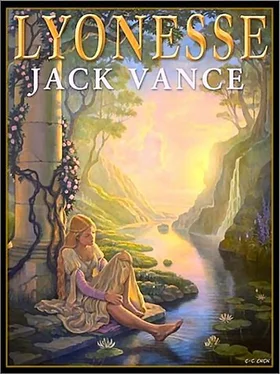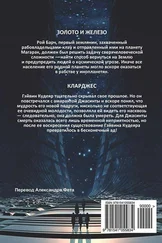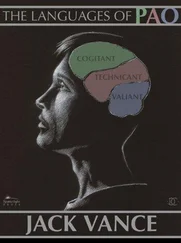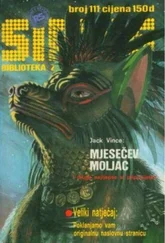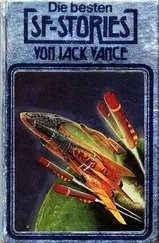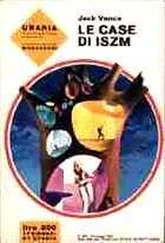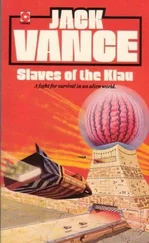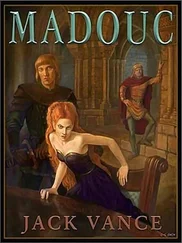Jack Vance - Lyonesse
Здесь есть возможность читать онлайн «Jack Vance - Lyonesse» весь текст электронной книги совершенно бесплатно (целиком полную версию без сокращений). В некоторых случаях можно слушать аудио, скачать через торрент в формате fb2 и присутствует краткое содержание. Жанр: Фантастика и фэнтези, на английском языке. Описание произведения, (предисловие) а так же отзывы посетителей доступны на портале библиотеки ЛибКат.
- Название:Lyonesse
- Автор:
- Жанр:
- Год:неизвестен
- ISBN:нет данных
- Рейтинг книги:4 / 5. Голосов: 1
-
Избранное:Добавить в избранное
- Отзывы:
-
Ваша оценка:
- 80
- 1
- 2
- 3
- 4
- 5
Lyonesse: краткое содержание, описание и аннотация
Предлагаем к чтению аннотацию, описание, краткое содержание или предисловие (зависит от того, что написал сам автор книги «Lyonesse»). Если вы не нашли необходимую информацию о книге — напишите в комментариях, мы постараемся отыскать её.
Lyonesse — читать онлайн бесплатно полную книгу (весь текст) целиком
Ниже представлен текст книги, разбитый по страницам. Система сохранения места последней прочитанной страницы, позволяет с удобством читать онлайн бесплатно книгу «Lyonesse», без необходимости каждый раз заново искать на чём Вы остановились. Поставьте закладку, и сможете в любой момент перейти на страницу, на которой закончили чтение.
Интервал:
Закладка:
He asked: "What do you want?"
"Last night I chanced to notice King Aillas as he came in for the banquet."
"Well then?"
"Did you find his face familiar?" An arch and meaningful smile trembled along Brother Umphred's lips.
Casmir glared at him. "As a matter of fact, I did. What of it?"
"Do you recall the young man who insisted that I marry him to the Princess Suldrun?"
Casmir's mouth sagged. He stared thunderstruck, first at Brother Umphred, then out across the sea. "I dropped him into the hole. He is dead."
"He escaped. He remembers."
Casmir snorted. "It is impossible. Prince Dhrun is all of ten years old."
"And how old do you make King Aillas?"
"He is, at a guess, twenty-two or twenty-three, no more."
"And he fathered a child at the age of twelve or thirteen?"
Casmir paced the floor, hands behind his back. "It is possible. There is mystery here." He paused and looked out to sea, where the Troice sails had now disappeared from view.
He signaled to Sir Mungo, his seneschal. "Do you recall the woman who was put to question in connection with the Princess Suldrun?"
"Sire, I do so remember."
"Fetch her here."
In due course Sir Mungo reported to Casmir. "Sire, I have tried to implement your will, but in vain. Ehirme, her spouse, her family, each and all: they have vacated their premises and it is said that they have removed to Troicinet, where they are now landed gentry."
Casmir made no response. He leaned back in his chair, lifted a goblet of red wine and studied the dancing reflections from the flames in the fireplace. To himself he muttered: "There is mystery here."
EPILOGUE
WHAT NOW?
King Casmir and his ambitions have temporarily been thwarted. Aillas, whom once he attempted to kill, is responsible, and Casmir already has developed a great detestation for Aillas. His intrigues continue. Tamurello, fearing Murgen, refers Casmir to the wizard Shan Farway. In their plotting they use the name "Joald" and both fall silent.
Princess Madouc, half-fairy, is a long-legged urchin with dark curls and a face of fascinating mobility. She is a creature of unorthodox habits; what will become of her? Who is her father? At her behest an adventurous boy named Traven undertakes a quest. If he succeeds she must grant him whatever boon he demands. Traven is captured by Osmin the ogre, but Traven saves himself by teaching his captor chess.
What of Glyneth, who loves Watershade and Miraldra, but yearns for her vagabond life with Dr. Fidelius? Who will woo and who will win her?
Aillas is King of South Ulfland and now he must reckon with the Ska, who wage war against the world. When he thinks of the Ska he thinks of Tatzel, who lives at Castle Sank. He knows a secret way into the fortress Poelitetz: how will this knowledge serve him?
Who nets the turbot who swallowed the green pearl? Who proudly wears the pearl in her locket and is impelled to curious excesses of conduct?
Many affairs remain unsettled. Dhrun can never forget the wrongs done him at Thripsey Shee by Falael, even though Falael has been punished well by King Throbius. From motives of sheer perversity Falael provokes the trolls of Komin Beg to war, in which they are led by a ferocious imp named Dardelloy.
What of Shimrod? How does he deal with the witch Melancthe?
And what of the knight of the Empty Helmet, and how does he comport himself at Castle Rhack?
At Swer Smod Murgen works to elucidate the mysteries of Doom, but each clarification propounds a new puzzle. Meanwhile, the adversary stands back in the shadows smiling his smile. He is potent and Murgen must presently tire, and in great sorrow concede defeat.
GLOSSARY I
IRELAND AND THE ELDER ISLES
Few definite facts are related of Partholon, a rebel prince of Dahaut, who after killing his father fled to Leinster. The Fomoire derived from North Ulfland, then known as Fomoiry. King Nemed, arriving with his folk from Norway, fought three great battles with the Fomoire near Donegal. The Ska, as the Neme-dians called themselves, were fierce warriors; the Fomoire, defeated twice, gained final victory only through the magic of three one-legged witches: Cuch, Gadish and Fehor: a battle in which Nemed was killed.
The Ska had fought with honor and valor; even in defeat they commanded the respect of the victors, so that they were allowed a year and a day to make their black ships ready for an onward voyage. At length, after three weeks of banquets, games, songs and the drinking of mead, they set sail from Ireland with Starn, first son of Nemed, as their king. Starn led the surviving Ska south to Skaghane, northernmost of the Hesperians, at the western verge of the Elder Isles.
Nemed's second son, Fergus, sailed to Amorica and assembled an army of a Celtic people known as the Firbolg, which he led back to Ireland. Along the way the Firbolg put into Fflaw at the tip of Wysrod, but so vast an army came to confront them that they left without a battle and continued to Ireland, where they became preeminent across the land.
A century later the Tuatha de Danaan, after an epic migration from central Europe through Asia Minor, Sicily and Spain, crossed the Cantabrian Gulf to the Elder Isles, and established themselves in Dascinet, Troicinet and Lyonesse. Sixty years later the Tuatha split into two factions, one of which moved on to Ireland, to fight the Firbolg at the First and Second Battles of Mag Tuired. The second Celtic surge which propelled the Milesians into Ireland and the Brythni into Britain bypassed the Elder Isles_ C s nonethelessLgrated into Hybras in sman groups and and established the Celtic kingdom Godelia.
GLOSSARY II:
THE FAIRIES
Fairies are halflings, like trolls, falloys, ogres and goblins, and unlike merrihews, sandestins, quists and darklings. Merrihews and sandestins both may manifest human semblance, but the occasion is one of caprice and always fugitive. Quists are always as they are, and darklings prefer only to hint of their presence.
Fairies, like the other halflings, are functionally hybrids, with varying proportions of earth-stuff. With the passage of time the proportion of earth-stuff increases, if only through the ingestion of air and water, though occasional coition of man and halfling hastens the process. As the halfling becomes "heavy" with earth-stuff it converges toward humanity and loses some or all of its magic.
The "heavy" fairy is abusively ejected from the shee as a boor and lummox, to wander the countryside and eventually merge into the human community, where it lives disconsolately and only rarely exercises its fading magic. The offspring of these creatures are peculiarly sensitive to magic, and often become witches or wizards: so with all the magicians of the Elder Isles.
Slowly, slowly the halflings dwindle; the shees grow dark, and the halfling life-stuff dissipates into the human race. Every person alive inherits more or less halfling-stuff from thousands of quiet infusions. In human inter-relationships the presence of this quality is a matter of general knowledge, but sensed sub-liminally and seldom accurately identified.
The fairy of the shee often seems childlike by reason of intemperate acts. His character varies of course from individual to individual, but is always capricious and often cruel. Similarly, the fairy's sympathies are quickly aroused, whereupon he becomes extravagantly generous. The fairy is inclined to be boastful; he is given to dramatic postures and quick sulks. He is sensitive in regard to his self-knage and cannot tolerate ridicule, which prompts him to a prancing demonstrative fury. He admires beauty and also grotesque oddity in the same degree; to the fairy these are equivalent attributes.
The fairy is erotically unpredictable and often remarkably promiscuous. Charm, youth, beauty are not cogent considerations; above all the fairy craves novelty. His attachments are seldom lasting, in common with all his moodsT He quickly shifts from joy to woe; from wrath through hysteria to laughter, or any of a dozen other affections unknown to the more stolid human race.
Читать дальшеИнтервал:
Закладка:
Похожие книги на «Lyonesse»
Представляем Вашему вниманию похожие книги на «Lyonesse» списком для выбора. Мы отобрали схожую по названию и смыслу литературу в надежде предоставить читателям больше вариантов отыскать новые, интересные, ещё непрочитанные произведения.
Обсуждение, отзывы о книге «Lyonesse» и просто собственные мнения читателей. Оставьте ваши комментарии, напишите, что Вы думаете о произведении, его смысле или главных героях. Укажите что конкретно понравилось, а что нет, и почему Вы так считаете.
